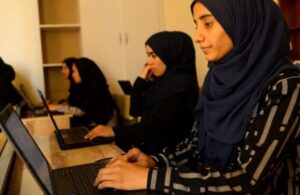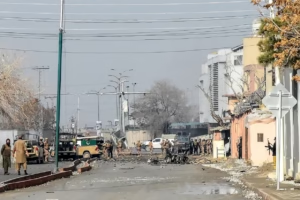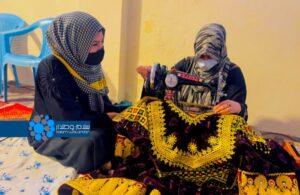KABUL (SW) – Salam Watandar has learned through a series of conversations in various provinces of Afghanistan, that women and girls who lack education have more than one reasons for their unfortunate illiteracy.
Among 30 women interviewed for this report, 13 cited family restrictions, 9 mentioned economic difficulties, 6 pointed to a lack of suitable conditions and ongoing conflict in the country, while 2 do not specify the reasons for remaining uneducated.
Out of these women, 27 expressed that they cannot read or write, while 3 said they have learned reading and writing from others.
These women highlighted that illiteracy negatively impacts various aspects of their lives, presenting serious challenges in their daily routines.
Gul Bibi, a 25-year-old resident of Faryab, who has been deprived of education due to family restrictions, said: “My family didn’t allow me to pursue my studies; I was very interested. My family’s circumstances made them unwilling for their daughters to attend school, fearing that non-mahrams (men) would see them.”
Nasima, a 36-year-old from Kabul, also points to family limitations: “My father was harsh; he said girls shouldn’t study and should stay home, cook, and bake bread. He didn’t let me attend school. Now, I’m illiterate and can’t help my family or my children.”
Nine women who attributed their lack of education primarily to economic problems, say that their inability to buy pens and notebooks, coupled with childhood labour to meet their families’ basic needs, prevented them from pursuing education.
Atika, a 25-year-old from Bamyan, shared: “I was the eldest child; my father was a farmer and had a few sheep; there was no one else, so I had to take care of the sheep until I was 12 or 13 while also helping my father with farming. Because of this, I remained uneducated.”
Zulaikha, aged 25, added: “Due to our poor economic situation, I couldn’t attend school. I had a family interest in education, and I was interested myself, but I couldn’t study because of financial hardships.”
Additionally, 6 women reported that insecurity, poor conditions, and internal conflict in the country have led their families to prevent them from attending school out of fear.
Marzia, 31, said: “Because of the wars, my family was strict and said that if I went to school, there might be a suicide bomber there; they told me not to go anymore, and that’s why I didn’t.”
Malalai, a 38-year-old, also explained her situation: “My father wouldn’t let me study when I was a child because it was an unsafe time.”
These women expressed that illiteracy has adversely affected various aspects of their lives, making it difficult for them to access basic services, read signs in the city and market, and assist their children with their education.
Farida, 27, and Mah Gul, 52, both consider themselves blind due to their lack of education, stating that illiteracy has caused serious problems in their daily lives.
Farida said: “When I go to the hospital and clinic, I can’t read the signs or understand the doctor’s name. When I go shopping, it’s very difficult for me; I can’t count the money. I can’t help my children with their homework.”
Similarly, Mah Gul adds: “A person who is illiterate is blind. When I go somewhere and see a sign, I don’t understand what is written on it. If we were educated, we would read and find our way.”
Experts in education emphasize the critical role of literacy in society, arguing that educated women contribute to a more informed, religious, and advanced society while also reinforcing social values.
Jamaluddin Sulaimani, an education expert, commented on the importance of women’s education: “In a society, the more educated women there are, the more we have an informed, religious, and advanced society. We should at least provide basic education, including reading and writing, to women and girls, gradually fostering a culture of female education in Afghan communities to create a society free from gender discrimination.”
Social issues experts also stress the importance of women’s education, saying that educated women are the foundation for an educated society.
Shoaib Ahmadi, a social issues expert, says: “If women remain illiterate and do not acquire knowledge, they will not be able to raise a new generation that builds new societies. There needs to be a program that addresses these societal problems.”
In addition, religious scholars emphasize that the criterion for superiority in Islamic values is knowledge, noting that in Islam, the pursuit of education is mandatory for both men and women.
Ata al-Haq Anas, a religious scholar, comments: “Knowledge is a virtue, and it serves as the standard for social superiority according to the verses of the Holy Quran. God Almighty mentions that He elevates some of you above others in rank. It is stated that those who know are not equal to those who do not.”
He stresses that the pursuit of knowledge is a fundamental principle in Islam, applicable to all Muslims, regardless of gender. Learning is equally essential for both Muslim women and men, reflecting the universal importance of education in fostering spiritual and social growth.
A lawyer, who chose to remain unnamed in this report, told Salam Watandar that there is currently no law in Afghanistan that grants women the right to education; however, according to Article 43 of the previous regime’s law, the right to education was granted, and no one had the authority to deny this right.
Officials from the Ministry of Propagation of Virtue and Prevention of Vice (MoPVPV) claim that they have raised awareness about the importance of education in Kabul and provinces, instructing mosque imams to discuss this topic.
Saif al-Islam Khaybar, the ministry’s spokesperson, said: “The Ministry of Propagation of Virtue and Prevention of Vice has directed its officials to advise and educate the public on the importance of education, and we have told mosque imams to discuss encouraging education for younger generations in their sermons.”
Salam Watandar attempted to get a response from the de-facto Ministry of Education regarding public awareness campaign to register girls in school but were unsuccessful. Similarly, Salam Watandar sought a response from the Ministry of Labour and Social Affairs about literacy programs for women but did not receive a reply.
Women in Afghanistan have long been speak about their prolonged deprivation of education, especially the recent political upheavals in the country have led to the de-facto government banning girls above grade six from attending school.
Recently, the United Nations Educational, Scientific and Cultural Organization (UNESCO) reported that the current government in Afghanistan has deprived 1.4 million girls of their right to education by prohibiting those above grade six from attending school.






